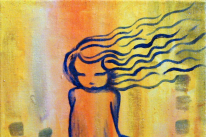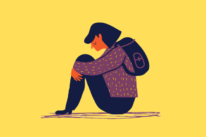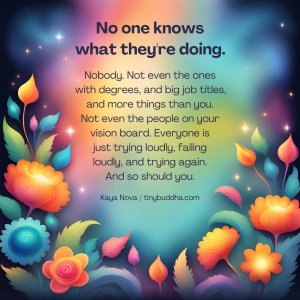
“The greatest gift you can give to others is the gift of unconditional love and acceptance.” ~Brian Tracy
Two months ago I travelled back home to Connecticut to care for a sick parent. My dad was preparing for cancer treatment, trying to figure out the medical system, and packing up to move all at the same time. He was overwhelmed with stress and exhausted from his pain medication. As a caring and health-conscious daughter, I was eager to help.
I had visions of cooking him meals of steamed greens and healthy soups. And I stocked my suitcase with supplements that would ease the pain and help his body detoxify. Growing up, I suffered from an autoimmune disorder called Celiac disease, which made any food with gluten in it toxic to me, so I deeply understood the link between what we consume and how the body functions.
It excited me to be able to pass this knowledge on to my dad. We always had a close bond, and in times of illness it’s easy to feel helpless. I figured this could be my contribution.
I was afraid to see my dad ill. I’d been living in Arizona for the past two years so I didn’t have to see the change in his appearance. The butterflies in my stomach expanded as I drove to his house the first time. Thinking of him being unable to move freely, work, and have a regular life tore me up inside.
My plan was to visit him every day for three weeks and to do whatever I could to help. Luckily, seeing him in person lifted some of my worry. He seemed motivated to try new things, like trade in his meat for vegetables. And he even listened intently while I showed him what supplements to take and when.
That set up didn’t last, though. As the days went on I noticed that the bottles of pills and their color-coded instructions didn’t move. I saw that the dirty pans in the kitchen were covered in grease. Once again, my stomach was in knots and I felt panicked.
The heaviness I felt about my dad’s illness subsided when I thought he was on board with my amateur health plan. And I was only suggesting what seemed like common sense. When he didn’t wholeheartedly take my advice, a feeling of grief took me over. I felt like he wasn’t taking care of himself and that I had wasted my time in coming to see him.
It felt like he was rejecting me.
One night about a week into my trip I spoke with my boyfriend on the phone. He was upset about a plumbing issue at the house and that our cat might be sick. Tears started streaming down my face involuntarily.
“It’s not so easy here, either,” I said with a wilt in my voice. It seemed that the stress my dad felt about his condition melted into me. And the fact that my plan to save him wasn’t working made me feel overextended.
And then it hit me: I was suffering because I judged the situation.
In my mind he wasn’t doing what he could to get better, and that was wrong. And by assigning that judgment, I suffered. As soon as I accepted that he could navigate this journey in any way he wished and that was okay, my internal pain disappeared. It was like magic.
Suddenly I felt my boundaries coming back. It was easier to go to visit him when I felt like it instead of being motivated by fear and obligation. I found a way to precook some meals for him that he could add into his meat dishes. I worked with and respected his choices.
He appreciated my new attitude. I wasn’t another person telling him what to do. What he really wanted was someone to listen, and I was now capable of doing that.
This made me more of a comfort and support to him and it gave me back the ability to actually enjoy myself. Before this epiphany I was choosing to stay in, feeling depressed instead of visiting with friends I hadn’t seen in months. Releasing judgment on my father’s situation gave me a multidimensional gift.
When I thought back to other times when I’ve suffered, I saw that the pattern held up. Addiction is a great example of this.
I’ve had a few close friends and family members battle drug and alcohol demons, and the feeling in my belly was the same. I felt heavy and sick when I thought about the choices those people were making and how hard their lives must be. But it wasn’t them giving me the feeling; it was my own judgment of their situation.
I was making their life path wrong.
There are plenty of things in my past that could have garnered the same judgment. I used to smoke cigarettes, I dropped out of high school and took my GED instead of graduating, I got married young and then got divorced. My life wasn’t picture perfect, but I wouldn’t trade those experiences for anything. They taught me valuable lessons, and without them, I wouldn’t be me.
The suffering I felt was my creation. It was a choice. And just as easily as the heavy feeling came on, it left as I reminded myself of that. I realized that true compassion can be felt without taking on any negative feeling. Compassion is love and acceptance of where a person is; it should feel good.
Do you have friends and family members that you feel are making the wrong choices? It’s an easy trap to get into when gossip magazines and shows feel like the cornerstone of our culture. Everyone is supposed to have an opinion on the lives of others. So don’t feel badly if you have taken on that task.
The next time you feel yourself sinking because of another person’s decisions, remember to pause. Ask yourself if you are taking on this feeling of heaviness because you are judging them. If the answer is yes, then see if you can let it go. You can turn your concern into acceptance and still serve your loved one in the way they most need.
There may be times when you recognize that someone is inflicting harm on themselves or others, and in this case you need to use your best judgment. Get a professional opinion or call the authorities when the moment warrants it. Trying to help in the best way you know how is also a way to ease suffering. Acting on your observation doesn’t make you the bad guy; it frees you of holding accountability for what’s happening.
Coming out of judgment allows you to communicate without attacking. You can hold your own boundaries better and decide from an unemotional place if there needs to be any further intervention. And don’t forget to share with your loved one that you care about them. Hearing that someone loves you is often the best medicine.
About Rachel Archelaus
Rachel Archelaus teaches people how to have a two-way conversation with their Higher Self using Intuitive Art. She also teaches healers and coaches how to incorporate this modality into their practices to create a business that supports their Purpose. Take a free Intuitive Art class at http://intuitiveartacademy.com.













 Though I run this site, it is not mine. It's ours. It's not about me. It's about us. Your stories and your wisdom are just as meaningful as mine.
Though I run this site, it is not mine. It's ours. It's not about me. It's about us. Your stories and your wisdom are just as meaningful as mine. 